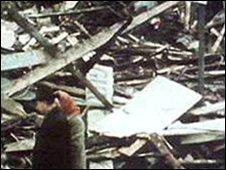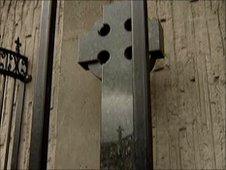Ombudsman finds no collusion in 1971 McGurk's Bar bomb
- Published

The devastation left at McGurk's bar
There is no evidence police colluded with the loyalist killers behind one of the worst atrocities of the Troubles, the Police Ombudsman has found.
Fifteen people died when a UVF bomb exploded at McGurk's Bar in north Belfast in December 1971.
The independent investigation found police allowed to go unchallenged an initial belief the bomb was an IRA device which went off prematurely.
This 'IRA own goal' theory had added to the pain felt by those bereaved.
The attack caused the single biggest loss of life in Northern Ireland prior to the Omagh bomb in 1998.
Of the 15 people killed, three were women and two were children.
In 1977, a UVF man who drove the getaway car admitted his part in the attack and it became clear that it was carried out by loyalist paramilitaries, the Ulster Volunteer Force.
The driver received 15 life sentences and remains the only person ever to have been convicted in relation to the explosion.
The office of Police Ombudsman Al Hutchinson began its investigation after some of the families of those who died made a complaint alleging police did not properly investigate the attack, colluded with those responsible and provided false information to suggest loyalists were not responsible.
The independent investigation found the allegation that police failed to thoroughly investigate the bombing was not substantiated.
"Given the available evidence of police activity, it is satisfied that in the context of 1971 and on the balance of probabilities, the police did conduct a reasonably thorough investigation," the Police Ombudsman said.
Investigators found no evidence that police or security forces conspired with the bombers at any stage, nor was there evidence of police criminality or misconduct.
Days after the bombing, the then minister for home affairs, John Taylor, told parliament that the theory the explosion took place within the building was supported by forensic evidence.
The ombudsman's team found no evidence that police had briefed the minister with false information before he made his statement.
"It is likely that the minister's information came from the military," the Police Ombudsman said.
It said its investigators had seen documentation passed between the military and the government "which not only discussed the possibility that republican terrorists had been preparing the bomb in the bar prior to planting it elsewhere, but actually sought to promote this idea".
"This was despite the fact that a retired military information officer interviewed by investigators has said that within 24 hours of the attack, the military were aware of the involvement of the UVF in the atrocity.
"There is no doubt that there was a desire to plant in the minds of the public the idea that the bombing was carried out by the IRA.
"The documentation we have seen, which not only discusses this aim but considers how it may be achieved, was documentation between the Army and the government.
"We have found no evidence that police had discussed promoting such an idea. What is clear, however, is that police let this belief go unchallenged."
In 2008, the Police Ombudsman's office commissioned a Home Office pathologist to reassess all the available material.
He concluded on the basis of some of the injuries that the bomb was placed outside an inner door and therefore outside the bar.
'Ridiculous'
This was similar to the findings of a forensic scientist who examined the scene of the blast the day after the explosion.

The monument in north Belfast to those killed in the bomb
Patrick McGurk, whose father, Patrick, was the bar owner, lost his mother, Philomena, who was 46 and his sister, Maria, who was 14 years old, in the bombing.
He said the ombudsman's report could not go unchallenged.
"My initial view is that it smacks of the police trying to absolve themselves of all responsibility for any wrong doing or incompetence," he said.
He described the report's conclusion saying that "on the balance of probabilities" the police conducted a "reasonably thorough investigation" as "patently ridiculous".
Mr McGurk said the facts pointed to the "distinct possibility that the police investigation had not been thorough".
"Is it not the case that, if the police jumped to an early conclusion about an IRA home goal, surely then, 'on the balance of probabilities' the police cannot have investigated thoroughly the possibility that it was a loyalist attack," he said.
A spokesman for the Police Ombudsman said: "We acknowledge that some of the families appear to have difficulties with parts of our report and we will of course arrange to meet them very soon to discuss these."
- Published8 July 2010